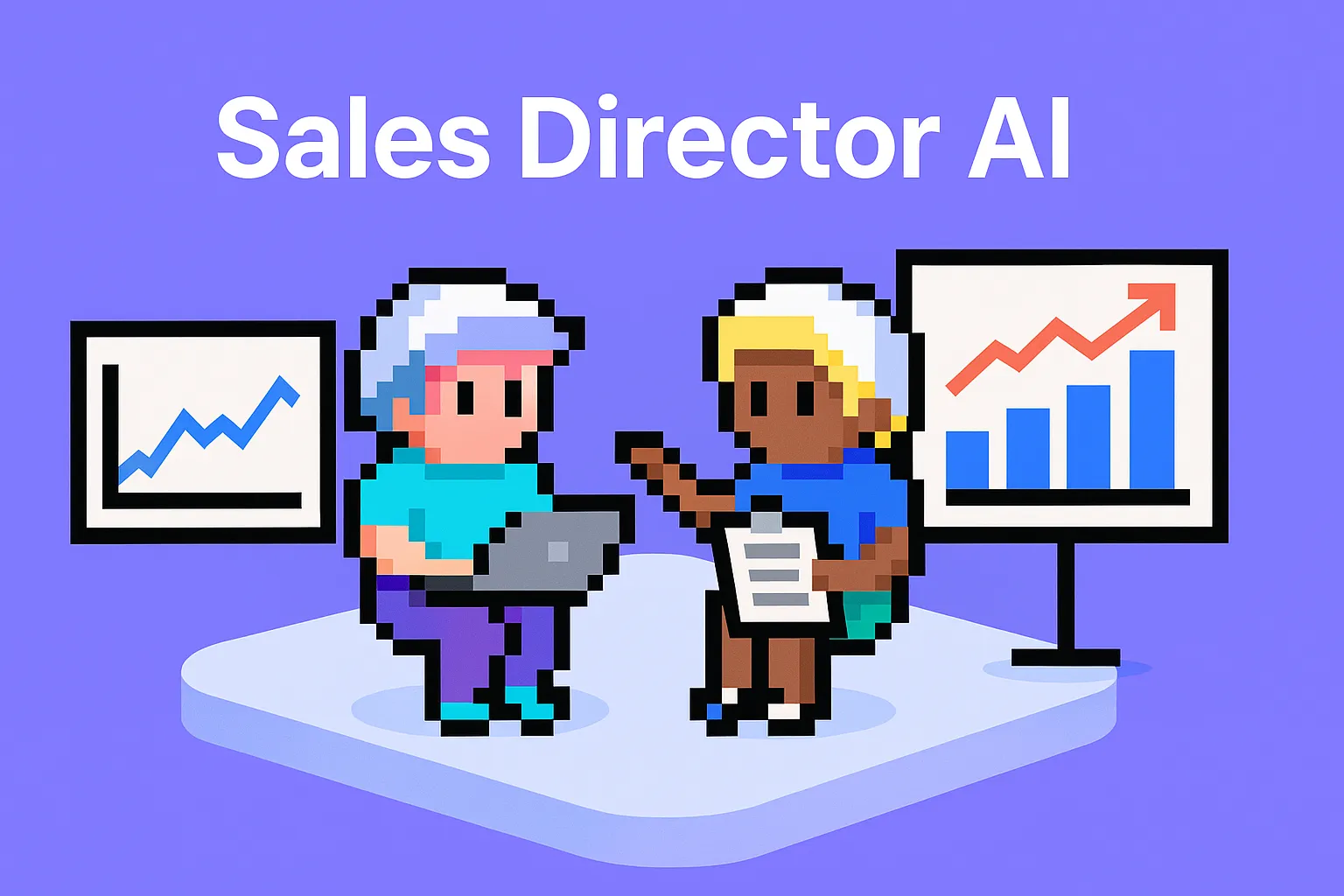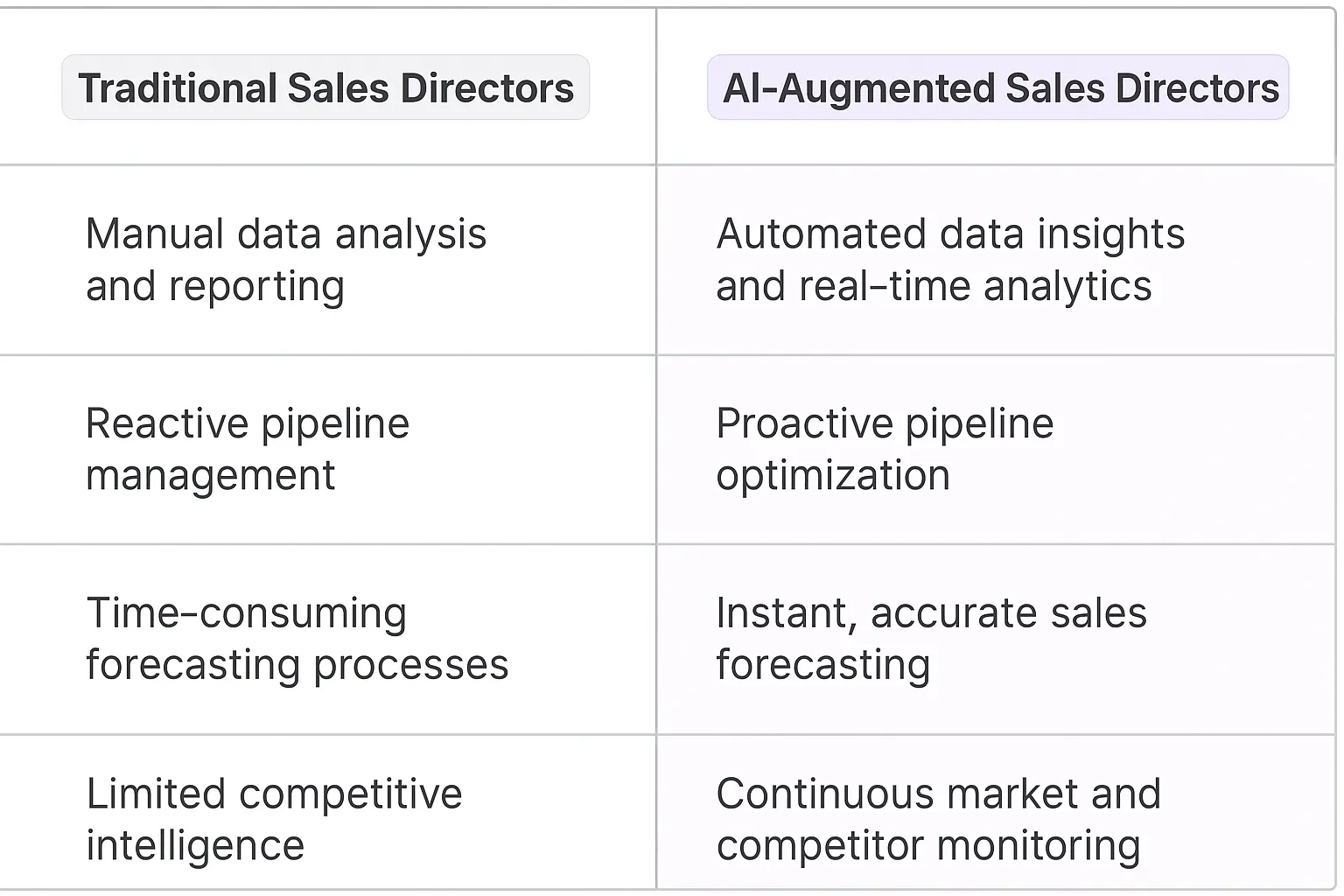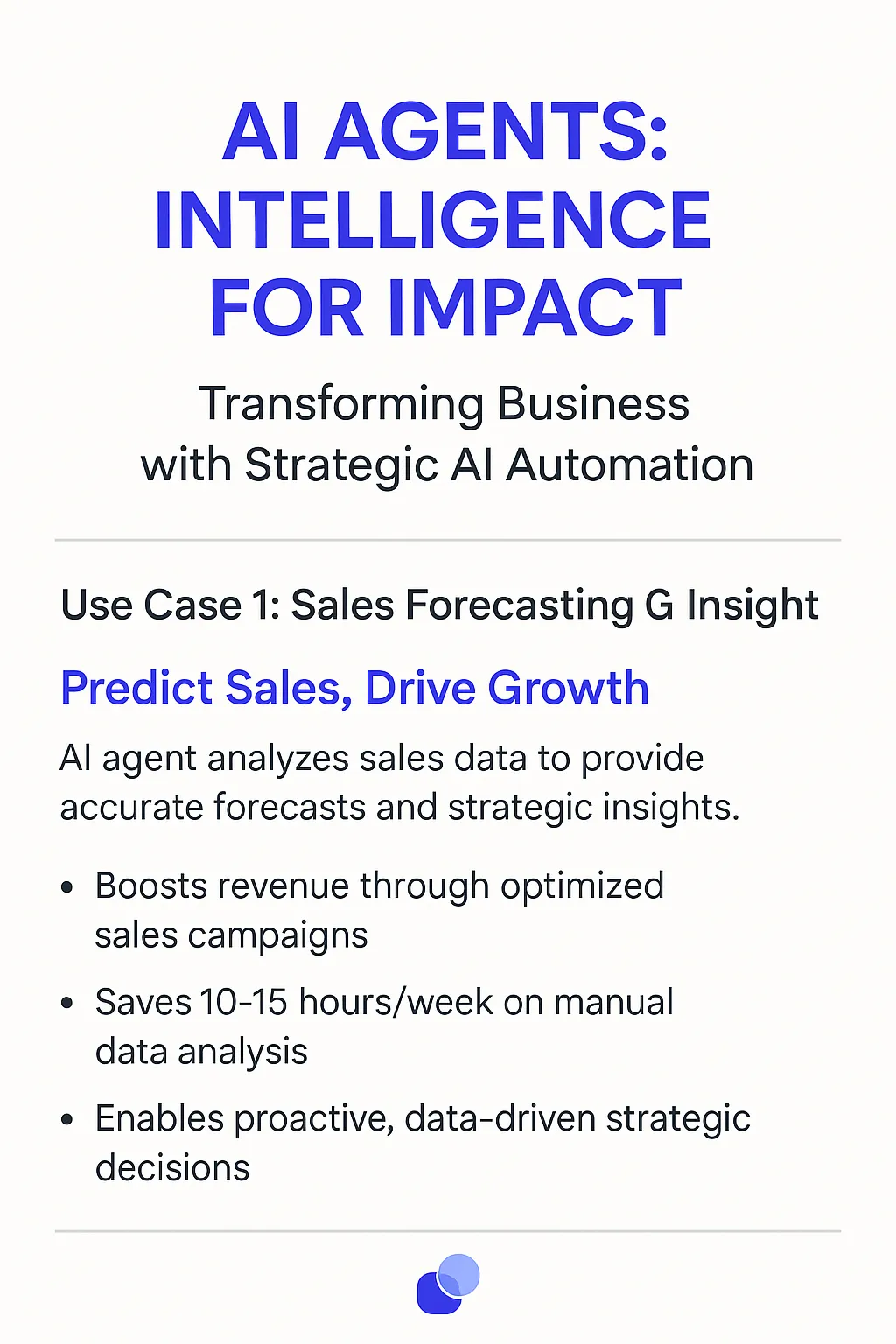A Sales Director is a high-level executive responsible for leading and managing a company's sales team. They develop sales strategies, set targets, analyze market trends, and ensure the team meets its revenue goals. In today's data-driven business landscape, Sales Directors are increasingly turning to AI agents to enhance their decision-making and streamline operations.

Before AI agents entered the scene, sales directors relied on a hodgepodge of tools and techniques to manage their teams and drive results. They'd spend hours poring over spreadsheets, CRM data, and pipeline reports. Team meetings were a constant juggling act of motivating reps, strategizing on deals, and trying to forecast accurately. It was like trying to conduct an orchestra while simultaneously playing every instrument.
Sales directors would often find themselves stuck in a reactive mode, putting out fires and struggling to stay ahead of market trends. They'd lean heavily on their own experience and gut instincts, which, while valuable, couldn't always keep pace with the rapidly evolving sales landscape.
Enter AI agents, and suddenly sales directors have a digital teammate that's like a combination of a top-tier analyst, a tireless researcher, and a prescient strategist. These AI agents are game-changers, and here's why:
First, they're data-crunching powerhouses. They can sift through mountains of sales data, customer interactions, and market trends in seconds, surfacing insights that would take a human team weeks to uncover. This means sales directors can make decisions based on a much richer, more comprehensive view of their sales ecosystem.
Second, AI agents excel at pattern recognition. They can spot emerging trends or potential issues in the sales pipeline before they become apparent to the human eye. This predictive capability allows sales directors to be proactive rather than reactive, addressing potential roadblocks before they materialize.
Third, these digital teammates are fantastic at personalization at scale. They can help tailor sales strategies for individual reps based on their strengths, weaknesses, and the specific challenges they're facing. It's like having a personal coach for every member of your sales team.
Fourth, AI agents are tireless. They can monitor sales activities 24/7, flagging important developments or opportunities that require immediate attention. This constant vigilance ensures that sales directors are always on top of their game, never missing a beat in the fast-paced world of sales.
Finally, and perhaps most importantly, AI agents free up sales directors to focus on what truly matters: strategy, team development, and high-level decision-making. By handling the grunt work of data analysis and routine tasks, these digital teammates allow sales directors to elevate their role, becoming true visionaries and leaders within their organizations.
In essence, AI agents are not just tools; they're transformative forces that are redefining what it means to be a sales director. They're turning sales leadership from a reactive, often overwhelming job into a proactive, strategic role that drives real business growth. And that's the kind of shift that doesn't just improve performance—it changes the game entirely.

Sales directors are constantly juggling multiple high-stakes responsibilities. They're the conductors of the sales orchestra, ensuring every instrument plays in harmony to create a symphony of closed deals and revenue growth. AI agents can step in as their digital teammates, handling the nitty-gritty so directors can focus on the big picture.
Take the sales forecasting process. Traditionally, this involves hours of poring over spreadsheets, historical data, and market trends. An AI agent can crunch these numbers in seconds, providing not just a forecast but also highlighting key factors influencing the predictions. This allows sales directors to make data-driven decisions quickly and confidently.
Another critical process is pipeline management. AI agents can continuously analyze the sales pipeline, flagging deals that are at risk of stalling or identifying opportunities that are ripe for closing. This real-time insight enables sales directors to allocate resources more effectively and coach their team on where to focus their efforts.
On a more granular level, AI agents can tackle a myriad of tasks that often eat into a sales director's valuable time. Consider the tedious task of preparing for board meetings. An AI agent can compile sales reports, create visually appealing presentations, and even draft talking points - all tailored to the specific metrics and KPIs that matter most to the board.
Competitive intelligence is another area where AI agents shine. They can continuously scan news sources, social media, and industry reports to keep sales directors informed about competitor moves, market shifts, and emerging trends. This real-time intelligence allows directors to pivot strategies quickly and stay ahead of the curve.
AI agents can also assist in talent management. They can analyze performance data of sales reps, identifying top performers and those who might need additional support. This data-driven approach to team management helps sales directors make informed decisions about training, promotions, and resource allocation.
The beauty of these AI-powered use cases is that they're not about replacing human judgment. Instead, they're about augmenting it. They provide sales directors with the insights and efficiencies needed to make better decisions faster. It's like giving them a superpower - the ability to be everywhere at once, armed with perfect information.
As these AI agents become more sophisticated, we'll likely see them take on even more complex tasks. Imagine an AI that can simulate different sales strategies, allowing directors to test approaches before rolling them out. Or one that can provide real-time coaching to sales reps during calls, based on the specific context of each conversation.
The potential is vast, and we're just scratching the surface. For sales directors willing to embrace these digital teammates, the future looks bright - filled with more closed deals, happier teams, and less time spent on busywork. It's not about AI replacing sales directors; it's about AI empowering them to be the best leaders they can be.

AI agents are reshaping how Sales Directors operate across industries, injecting a dose of digital intelligence into traditionally human-centric roles. These digital teammates aren't just fancy chatbots; they're sophisticated tools that can parse complex sales data, predict market trends, and even help craft winning pitches. Let's dive into some concrete examples of how these AI agents are making waves in different sectors, transforming the way Sales Directors strategize and execute their plans. From tech startups to Fortune 500 giants, the impact is real and the potential is massive. We're talking about AI that doesn't just assist, but actively contributes to closing deals and driving revenue growth. So buckle up as we explore how these AI agents are becoming the secret weapons in a Sales Director's arsenal across various industries.
The real estate industry is ripe for disruption, and Sales Director AI agents are poised to be the game-changers. Think about it: in a field where personal relationships are paramount, how do you scale that human touch? Enter the AI-powered Sales Director.
These digital teammates aren't just glorified chatbots. They're sophisticated systems that can analyze market trends, buyer preferences, and property data at a scale no human could match. But here's where it gets interesting: they use this data to craft personalized outreach strategies for each potential buyer or seller.
Imagine a real estate firm where every lead gets the attention of a top-tier sales director, 24/7. The AI agent can engage in natural language conversations, answering complex questions about property values, neighborhood trends, or mortgage rates. It can schedule viewings, follow up on leads, and even negotiate offers - all while maintaining that crucial personal touch.
But the real power lies in its ability to learn and adapt. Every interaction, every closed deal, every lost opportunity becomes data that the AI uses to refine its approach. Over time, it becomes an invaluable repository of sales knowledge and strategies, accessible to every human agent in the firm.
This isn't about replacing human agents. It's about augmenting them. The AI handles the grunt work - lead qualification, initial outreach, data analysis - freeing up human agents to focus on what they do best: building relationships and closing deals.
The result? A real estate firm that can operate at unprecedented scale without losing that personal touch. It's not just about efficiency; it's about creating a better experience for buyers and sellers alike. And in an industry where reputation is everything, that's the kind of edge that can propel a firm from local player to market leader.
The real estate industry is just the beginning. As these AI Sales Directors evolve, they'll reshape how we think about sales across sectors. It's not a question of if, but when. The firms that embrace this technology early will be the ones writing the playbook for 21st-century sales.
Let's talk about e-commerce. It's a space where the sheer volume of transactions can make personalization feel like a pipe dream. But what if every customer could have their own personal sales director? That's where AI Sales Directors are changing the game.
These digital teammates are not just recommendation engines on steroids. They're sophisticated systems that can analyze customer behavior, purchase history, and market trends in real-time. The result? A level of personalization that feels almost prescient.
Consider an online fashion retailer. The AI Sales Director doesn't just suggest products based on past purchases. It understands the nuances of style, the cyclical nature of fashion trends, and even the impact of external factors like weather or upcoming events. It's like having a personal stylist who knows your wardrobe better than you do.
But here's where it gets interesting: these AI agents can engage in natural language conversations across multiple channels. They can answer complex questions about product details, suggest complementary items, and even handle returns or exchanges. All while maintaining a consistent brand voice and personalized approach.
The real power, though, lies in their ability to learn and adapt. Every interaction, every purchase, every abandoned cart becomes data that refines the AI's understanding. Over time, it develops an intuitive grasp of customer preferences that goes beyond simple demographics or purchase history.
This isn't about replacing human customer service reps. It's about augmenting them. The AI handles the high-volume, routine interactions, freeing up human agents to deal with complex issues that require empathy and nuanced understanding.
The impact on customer lifetime value is profound. When customers feel understood and valued, they're more likely to return. And in the cutthroat world of e-commerce, customer retention is the holy grail.
But it's not just about driving sales. These AI Sales Directors are reshaping the entire customer journey. They're turning what used to be transactional interactions into ongoing relationships. It's a shift from reactive to proactive customer service.
The e-commerce brands that embrace this technology aren't just optimizing their sales funnel. They're fundamentally changing how they interact with customers. And in a world where brand loyalty is increasingly rare, that's a competitive advantage that can't be overstated.
As these AI Sales Directors evolve, they'll redefine what we expect from online shopping experiences. The question isn't whether this technology will become ubiquitous, but who will be the first to truly harness its potential. The e-commerce landscape is about to undergo a seismic shift, and the early adopters will be the ones writing the new rules of engagement.
Implementing a Sales Director AI Agent isn't just about plugging in some fancy algorithm and watching the magic happen. It's a complex dance of data, integration, and machine learning that can make even the most seasoned tech teams break a sweat.
First off, you're dealing with a massive amount of data from various sources - CRM systems, email interactions, call logs, and even social media. Cleaning and structuring this data is like trying to organize a teenager's bedroom - it's messy, time-consuming, and you're never quite sure what you'll find.
Then there's the challenge of real-time processing. Your AI Sales Director needs to be as quick on its feet as a human sales pro, making split-second decisions based on the latest data. This requires some serious computational muscle and clever algorithms that can prioritize and process information at lightning speed.
Let's not forget about integration. Your AI agent needs to play nice with existing sales tools and platforms. It's like introducing a new player to a well-oiled sports team - if they can't sync up with the existing plays, you're in for a world of hurt.
On the operational side, things get even trickier. You're essentially asking your sales team to trust a digital teammate with critical decisions. That's like asking a chef to let a robot season their signature dish - it's going to take some convincing.
Training the AI is another beast altogether. Sales strategies vary wildly across industries and even within companies. Your AI needs to learn the nuances of your specific sales process, which means feeding it years of historical data and constantly fine-tuning its algorithms. It's like teaching a newborn to run a marathon - it takes time, patience, and a lot of trial and error.
Then there's the ethical minefield of AI-driven sales. How do you ensure your digital Sales Director isn't crossing lines or making biased decisions? It's a balancing act between maximizing sales and maintaining your company's values and reputation.
Lastly, you need to consider the human factor. A Sales Director AI Agent isn't meant to replace your human team, but to enhance their capabilities. Finding that sweet spot where AI and human expertise complement each other is crucial. It's like conducting an orchestra - get the balance wrong, and you'll end up with a cacophony instead of a symphony.
Implementing a Sales Director AI Agent is no walk in the park. But for those who can navigate these challenges, the potential rewards in terms of efficiency, insights, and sales performance are enormous. It's a high-stakes game, but one that could redefine the future of sales leadership.
The integration of AI agents into the Sales Director role marks a pivotal shift in sales leadership. These digital teammates are not just tools; they're transformative forces that are redefining what it means to lead a sales team. By handling data analysis, routine tasks, and providing predictive insights, AI agents allow Sales Directors to focus on strategy and team development.
However, the implementation of these AI systems comes with its own set of challenges. From technical hurdles like data integration and real-time processing to operational issues such as team adoption and ethical considerations, companies must navigate carefully to harness the full potential of AI in sales leadership.
Despite these challenges, the potential benefits are immense. AI-augmented Sales Directors can drive unprecedented efficiency, personalization, and growth. As this technology continues to evolve, we can expect to see a new breed of sales leaders emerge - ones who seamlessly blend human intuition with AI-powered insights to drive their teams to new heights of success.
The future of sales leadership is here, and it's powered by AI. The question isn't whether to adopt these technologies, but how quickly and effectively companies can integrate them into their sales strategies. Those who successfully navigate this transition will find themselves at the forefront of a new era in sales, ready to seize opportunities that were previously unimaginable.